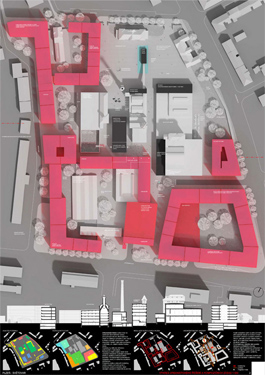
Contaminated insulation threatens the condition of the Světovar building in Plzeň
 |
"The most significant issue is the contaminated thermal insulation. The project assumed the presence of a substance called corkolit, but upon exposing the walls, it was discovered that it is actually corkodehet, which is corkolit mixed with tar," he stated.
According to assessments available to the city, the carcinogens are present in such quantities that the insulation in the century-old building cannot remain. The city is therefore waiting for documentation from the designer, who will provide a cost estimate for the removal. The contractor has estimated the cost to be nearly 50 million CZK. The construction cost, however, is 246 million CZK.
According to information from ČTK, health inspectors have also commented on the matter and have restricted access to the building. "We cannot allow continued demolition work," said Oldřich Sojka from the Regional Hygiene Station to ČTK today. Strict regulations now apply on the construction site, and a controlled zone has been established. The removal of the insulation will only be possible in a specially designed negative pressure tent using protective equipment, in a special regime. The material must be treated as hazardous waste. The contractor, the Světovar Association, which consists of POHL, BAK construction company, and CGM CZECH, has conducted laboratory tests at its own expense.
The Světovar case will be reviewed by councilors next Thursday, who will decide whether to release the necessary funds for remediation. According to Šindelář, there are 63 million CZK available for this purpose. "I insist that this money should only be used if there is a grant for Světovar. Without it, the project is very poorly financeable," said Šindelář. Světovar has received a grant of 100 million, but the city must definitively state by September whether it will proceed with the project. If so, the factory and archive must be completed by September 2015.
The potential negligence of the designers will also be addressed; the city has an expert opinion stating that the designer, the Helika design office, should have anticipated that the insulation could be contaminated. Helika rejects responsibility and possesses an opinion stating that the occurrence of corkodehet is anomalous and could not have been foreseen. The city is currently negotiating with Helika, and the preparation of a general expert report is on the table.
Regarding Světovar, the option of preserving the building is also under consideration; however, in this scenario, the insulation must not remain in the building. Given the health authorities' stance, the city is currently assessing how dangerous the area may be to its surroundings.
Since the area will not open on the originally scheduled date of February 28, 2015, part of the planned program for Plzeň as a city of culture will be moved to the depot area on Cukrovarská Street, for which the council has approved five million for renovations. The issue surrounding Světovar is also complicating the city’s efforts to obtain the Melina Mercouri Prize, which entails 1.5 million euros, and it also affects the adjacent development area of Světovar that the city is offering to developers.
The English translation is powered by AI tool. Switch to Czech to view the original text source.
0 comments
add comment
Related articles
0
03.02.2023 | Plzeň will complete the renovation of Světovar, there will be apartments, an innovation park, and a parking garage
0
17.08.2017 | Plzeň is preparing constructions in the former barracks and the Světovar brewery
0
15.09.2016 | Plzeň will pay 13 million for the project of a new archive headquarters
0
17.05.2016 | Plzeň is preparing a technology park and archive in the former barracks
0
20.04.2015 | Plzeň will offer part of the brewery and Světovar to developers
0
12.12.2014 | Plzeň will preserve the cultural center and archive Světovar for two years
0
06.10.2014 | The fate of the Světovar in Plzeň is uncertain, the positions of the parties vary significantly
0
05.09.2014 | The fate of the Světopar in Plzeň remains open, a contract for remediation is underway
0
01.09.2014 | The fate of the archive and cultural factory in Světovar is still unclear
0
19.08.2014 | The fate of the cultural factory in Plzeň could be clear in a week
1
26.01.2014 | Plzeň offers developers a valuable location of the former Světovar barracks
0
02.10.2013 | Plzeň begins the reconstruction of the former brewery and Světovar barracks
0
04.12.2012 | The results of the competition for the cultural factory Světovar in Plzeň
0
10.10.2012 | Plzeň has prepared the area of the former Světovar brewery for investors
0
14.02.2012 | In Pilsen, the realization of the cultural factory Světovar will begin next year
0
06.08.2010 | Results of the competition for the design of the Světovar brewery space in Plzeň
0
24.05.2010 | Plzeň announces an urban architectural competition for the design solution of the former Světovar brewery site
0
16.05.2010 | Competition for a multicultural center in the former Světovar Brewery in Plzeň
0
09.04.2010 | Architectural competition in Pilsen will provide advice on how to utilize the former barracks












